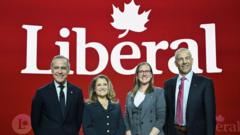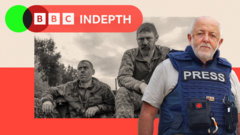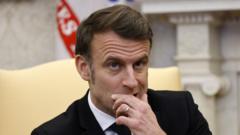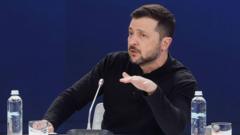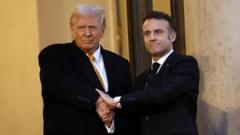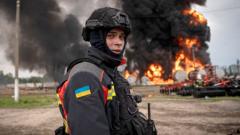The US, under the Trump administration, notably sided with Russia in UN votes marking the anniversary of the Ukraine invasion, opposing a European resolution but supporting a more neutral one. This realignment underscores tensions in transatlantic relations and highlights America's evolving role in European security.
US Realigns Position on Ukraine Conflict at the UN, Supporting Russia in Key Votes
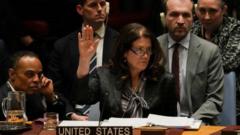
US Realigns Position on Ukraine Conflict at the UN, Supporting Russia in Key Votes
In a surprising shift, the US backs resolutions at the UN that align with Russia’s stance on the Ukraine war, raising concerns among European allies.
The US has recently demonstrated a significant shift in its approach to the ongoing conflict in Ukraine by siding with Russia in two key votes at the United Nations, coinciding with the third anniversary of Russia's invasion. This change, attributed to the Trump administration’s policies, has raised eyebrows and concerns among traditional American allies in Europe.
During the discussions, the US opposed a resolution drafted by European nations that condemned Russia's actions and affirmed Ukraine's territorial integrity. Instead, America aligned itself with a US-drafted resolution at the UN Security Council that called for an end to hostilities without directly criticizing Russia. The European-drafted resolution managed to pass in the UN General Assembly with a vote of 93 in favor, but the US's negative vote along with Russia and a handful of other nations, including Israel and North Korea, highlighted a stark discord.
The US envoy to the UN, Dorothy Camille Shea, defended her nation’s resolution as a "simple historic statement" focused on peace rather than placing blame. In contrast, European diplomats, including Ukrainian Deputy Foreign Minister Mariana Betsa, expressed dismay at the US's reluctance to condemn the aggression, emphasizing that such actions should not be rewarded or overlooked.
As discussions proceeded, British Prime Minister Sir Keir Starmer's forthcoming visit to the US signifies efforts to address the growing fracture in the transatlantic alliance spurred by Trump's administration’s stance towards Moscow. Notably, key allies like the UK and France abstained from voting on the American resolution, expressing their frustration over the lack of accountability for Russian aggression.
The geopolitical landscape remains complicated as Russia, a permanent member of the UN Security Council with veto power, continues to influence debates, leading often to deadlock. Although the UN General Assembly allows for more debate on the conflict, its resolutions lack the binding power of Security Council mandates.
As tensions escalate, the dynamics between the US, its European allies, and Russia will be critical in shaping the future of the Ukraine conflict and broader European security.
During the discussions, the US opposed a resolution drafted by European nations that condemned Russia's actions and affirmed Ukraine's territorial integrity. Instead, America aligned itself with a US-drafted resolution at the UN Security Council that called for an end to hostilities without directly criticizing Russia. The European-drafted resolution managed to pass in the UN General Assembly with a vote of 93 in favor, but the US's negative vote along with Russia and a handful of other nations, including Israel and North Korea, highlighted a stark discord.
The US envoy to the UN, Dorothy Camille Shea, defended her nation’s resolution as a "simple historic statement" focused on peace rather than placing blame. In contrast, European diplomats, including Ukrainian Deputy Foreign Minister Mariana Betsa, expressed dismay at the US's reluctance to condemn the aggression, emphasizing that such actions should not be rewarded or overlooked.
As discussions proceeded, British Prime Minister Sir Keir Starmer's forthcoming visit to the US signifies efforts to address the growing fracture in the transatlantic alliance spurred by Trump's administration’s stance towards Moscow. Notably, key allies like the UK and France abstained from voting on the American resolution, expressing their frustration over the lack of accountability for Russian aggression.
The geopolitical landscape remains complicated as Russia, a permanent member of the UN Security Council with veto power, continues to influence debates, leading often to deadlock. Although the UN General Assembly allows for more debate on the conflict, its resolutions lack the binding power of Security Council mandates.
As tensions escalate, the dynamics between the US, its European allies, and Russia will be critical in shaping the future of the Ukraine conflict and broader European security.


